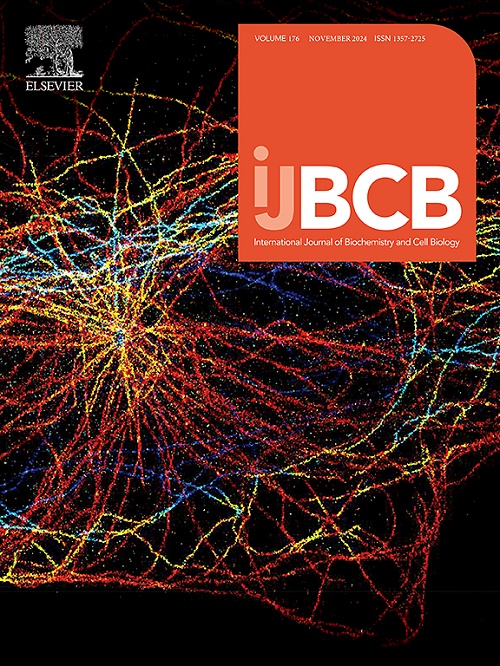高血糖诱导 DNA 甲基转移酶 1 依赖于 2 型糖尿病内皮外泌体蛋白质组的表观遗传学重编程。
IF 3.4
3区 生物学
Q2 BIOCHEMISTRY & MOLECULAR BIOLOGY
International Journal of Biochemistry & Cell Biology
Pub Date : 2024-09-19
DOI:10.1016/j.biocel.2024.106664
引用次数: 0
摘要
为应对高血糖,内皮细胞(ECs)会释放蛋白质含量改变的外泌体,并促进旁分泌信号的传递,从而导致 2 型糖尿病(T2D)患者的血管功能障碍。高血糖会对包括血管内皮细胞在内的各种细胞/组织类型的DNA甲基化模式进行重编程,从而导致蛋白质组发生病理相关变化。然而,内皮外泌体中基于 DNA 甲基化的蛋白质组重编以及对 T2D 的相关病理影响尚不清楚。因此,在本研究中,我们使用人脐静脉内皮细胞(HUVECs)、高脂饮食(HFD)诱导的糖尿病小鼠(C57BL/6)和临床模型来了解外泌体蛋白质组对高糖和 DNMT1 过表达的反应。外泌体通过尺寸排阻色谱法分离,并进行串联质量标签(TMT)标记的定量蛋白质组学和生物信息学分析。免疫印迹法验证了具有临床特征的 T2D 患者的外泌体蛋白特征。我们观察到在高糖环境下培养的心血管细胞和来自高密度脂蛋白胆固醇(HFD)小鼠的主动脉心血管细胞表达了升高的DNA甲基转移酶1(DNMT1)水平。从经高糖处理并过表达 DNMT1 的心血管细胞中分离出的外泌体的定量蛋白质组学研究显示,蛋白质水平和翻译后修饰都发生了显著变化,这与 T2D 相关的血管功能一致。根据本体论和基因-功能-疾病相互作用分析,与血管并发症有关的不同表达的外泌体蛋白,如Thrombospondin1、Pentraxin3和胱抑素C,在高糖和高脂蛋白胆固醇动物以及糖化血红蛋白水平较高的T2D患者的HUVECs中显著增加。用 5-Aza-2'-deoxycytidine 处理后,这些蛋白会减少。我们的研究显示了外泌体蛋白质组在 T2D 相关血管并发症中的表观遗传调控。本文章由计算机程序翻译,如有差异,请以英文原文为准。
High glucose induces DNA methyltransferase 1 dependent epigenetic reprogramming of the endothelial exosome proteome in type 2 diabetes
In response to hyperglycemia, endothelial cells (ECs) release exosomes with altered protein content and contribute to paracrine signalling, subsequently leading to vascular dysfunction in type 2 diabetes (T2D). High glucose reprograms DNA methylation patterns in various cell/tissue types, including ECs, resulting in pathologically relevant changes in cellular and extracellular proteome. However, DNA methylation-based proteome reprogramming in endothelial exosomes and associated pathological implications in T2D are not known. Hence, in the present study, we used Human umbilical vein endothelial cells (HUVECs), High Fat Diet (HFD) induced diabetic mice (C57BL/6) and clinical models to understand epigenetic basis of exosome proteome regulation in T2D pathogenesis . Exosomes were isolated by size exclusion chromatography and subjected to tandem mass tag (TMT) labelled quantitative proteomics and bioinformatics analysis. Immunoblotting was performed to validate exosome protein signature in clinically characterized individuals with T2D. We observed ECs cultured in high glucose and aortic ECs from HFD mouse expressed elevated DNA methyltransferase1 (DNMT1) levels. Quantitative proteomics of exosomes isolated from ECs treated with high glucose and overexpressing DNMT1 showed significant alterations in both protein levels and post translational modifications which were aligned to T2D associated vascular functions. Based on ontology and gene-function-disease interaction analysis, differentially expressed exosome proteins such as Thrombospondin1, Pentraxin3 and Cystatin C related to vascular complications were significantly increased in HUVECs treated with high glucose and HFD animals and T2D individuals with higher levels of glycated hemoglobin. These proteins were reduced upon treatment with 5-Aza-2’-deoxycytidine. Our study shows epigenetic regulation of exosome proteome in T2D associated vascular complications.
求助全文
通过发布文献求助,成功后即可免费获取论文全文。
去求助
来源期刊
CiteScore
8.10
自引率
0.00%
发文量
124
审稿时长
19 days
期刊介绍:
IJBCB publishes original research articles, invited reviews and in-focus articles in all areas of cell and molecular biology and biomedical research.
Topics of interest include, but are not limited to:
-Mechanistic studies of cells, cell organelles, sub-cellular molecular pathways and metabolism
-Novel insights into disease pathogenesis
-Nanotechnology with implication to biological and medical processes
-Genomics and bioinformatics

 求助内容:
求助内容: 应助结果提醒方式:
应助结果提醒方式:


